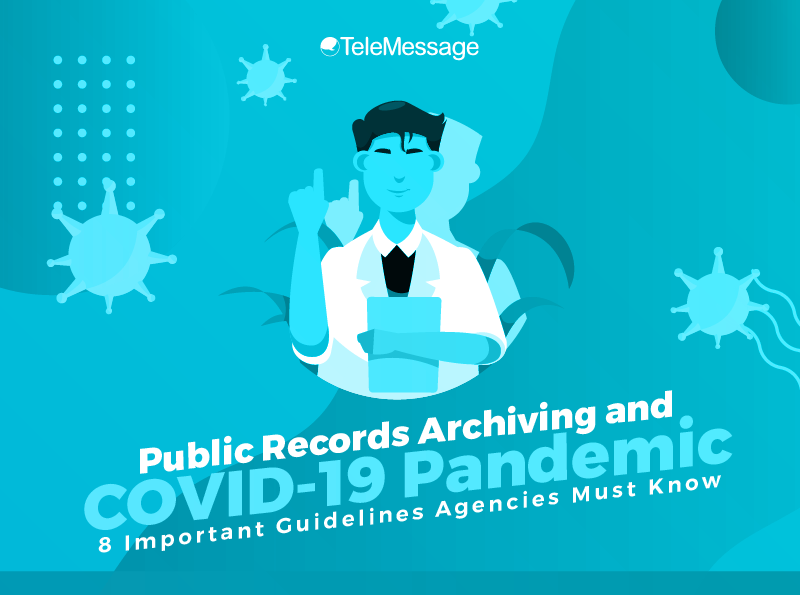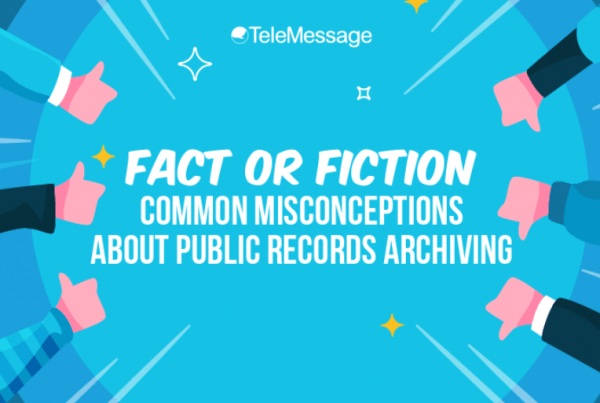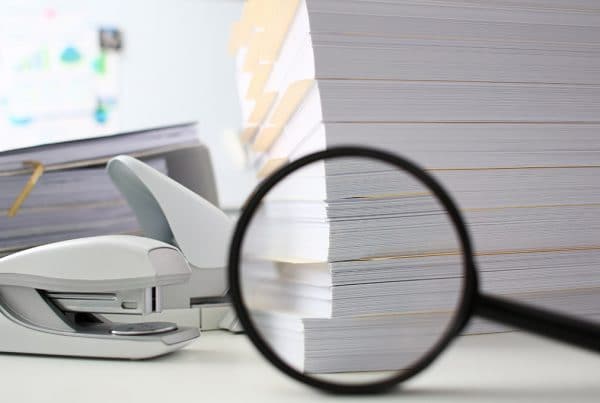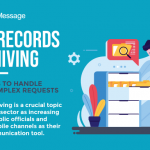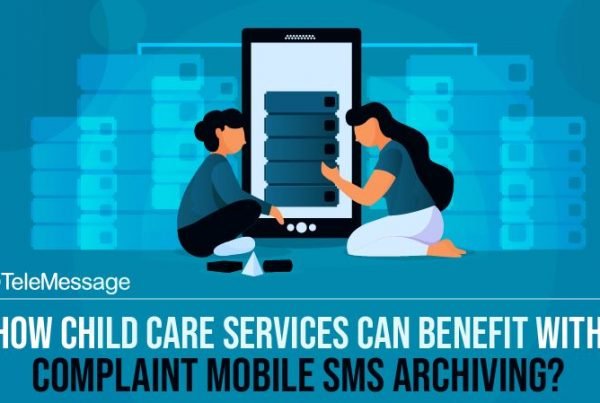Public records archiving is crucial in the government sector. More and more federal employees work from home and use mobile channels, either personal or employee-issued, to communicate with others, thanks to the COVID-19 pandemic. As government agencies move away from desktop email and other traditional communications channels and shift to mobile SMS, WhatsApp, and other mobile messaging apps, it’s become more challenging to retain public records.
The Texas 944 text message law is an example of a law that agencies must comply with as proof of adapting to many people’s shift towards mobile channels. Local governments must adapt to the new ways public sector employees communicate to ensure that they can respond to public records requests efficiently. It’s vital to comply with public records laws to avoid any violations with the law.
Public agencies may face difficulties when capturing and maintaining public records. One requirement is that federal employees using non-official electronic messaging channels must copy the electronic message or forward the message to an official account within 20 days, as stated in the Federal Records Act (44 U.S.C. 2911). Agencies must follow the guidelines below to ensure compliance with such laws.

Monitor Communications Done Through Video Conferencing Platforms?
Most meetings, seminars, training sessions, and other company events were moved to a new virtual environment. It’s imperative to continue to manage communication records created with these tools, similar to how they maintained records of physical meetings. The video meetings must be recorded and retained in the agency’s archive.
However, such tools do not require a records schedule.
Treating Documents Printed at Home as Federal Records
Government agency employees might print out documents that contain unique information that can be classified as public records. There will be implications on the records management, FOIA, and information security standpoint. Thus, agencies must review GRS 5.2 and instruct their employees on how to manage these records.
The printouts and handwritten notes may contain unique information, and they might need to be managed separately from electronic records that lack said information.
Retaining Employee Medical Records Related to COVID-19
The GRS 2.7, Employee Health and Safety Records, includes several items for employee medical files, specifically, items covering official employee medical files and unofficial medical files. The occupational individual medical case files are included in items 060-062, while non-occupational individual medical case files are included in item 070. Should information about COVID-19 be entered in the individual employee medical files, the items mentioned above will not apply.
The GRS 2.7 items 040-043 or the Workplace Environmental Monitoring and Exposure Records do not apply to track an employee’s exposure to COVID-19. Items 040-043 only apply to exposure to OSHA-regulated substances, Lead (Pb), noise, Dibromochloropropane (DBCP), Acrylonitrile, Inorganic Arsenic, and Coke Oven emissions.
Retaining Agency Response Records on COVID-19
The agency’s plans to respond to COVID-19 are covered by GRS 5.3 or the Continuity and Emergency Planning Records. GRS 5.3 includes records on Federal agency internal emergency planning to protect the people, the government facilities, the equipment, and the documents. This coverage is meant to secure classified or sensitive information, ensure continuity of agency operations in the face of disasters, and facilitate timely recovery and return to normal activities after the disaster.
Regarding the coronavirus pandemic, only the planning phase is covered. G.R.S. does not cover any incident response or external emergency planning records regarding providing emergency response services to the public. Such documents are to be scheduled for agency-specific schedules.
Agencies must have scheduled records for an incident response if they don’t have approved disposition authority for them. If such documents can be applied to the COVID-19 response, then they must be scheduled as well. COVID-19 internal emergency planning records may be of permanent value as they were acted upon in the event of a national emergency. Agencies can request to schedule such records as permanent, but not all COVID-19 internal emergency plans can be classified as permanent.
NARA or the National Archives of the United States will consider if the schedules from the agencies should be permanent. The agency’s NARA appraisal archivist may be contacted for questions on whether a particular record is permanent or not.
NARA will also not issue a G.R.S. to cover COVID-19 records since an agency’s existing schedules may already cover them.
Consider if G.R.S. Covers Records on Employee Exposure to COVID-19
Unless the information gathered from tracking employee exposure, testing, or quarantining related to the coronavirus is placed in individual employee medical files, G.R.S. does not cover it. If the records cannot be applied to individual employee medical files, they may need to be scheduled.
Consider if Disposition Authorities can be Applied for COVID-19 Records
Agencies may apply disposition authorities for COVID-19 records that are related to disaster response, incident response, provided that the authorities are not written to apply to documents that are related to only one specific incident. It’s advisable to contact the agency’s assigned NARA appraisal archivist to see if the agency’s authority can be applied to COVID-19 response records.
If the agency does not have disposition authority for disaster, incident, or pandemic response, then the records about the response to COVID-19 must be scheduled.
Consider if Scheduled Records Regarding Employee Health and Agency Response and Planning Should Be Kept Longer than Scheduled
The record’s retention schedule must consider future business needs and the potential to use the files for litigation or seeking benefits. After the current public health crisis ends, the agencies must work with their internal stakeholders and their Office of General Counsel or (O.G.C.) to determine if the records must be re-appraised.
It’s necessary to stay in contact with the O.G.C. to determine if a COVID-19 record should be kept in case of litigation. Still, NARA does not recommend retaining records for “just in case” scenarios as it will lead to a lack of clarity in data retention policies. Litigation holds must be implemented following the Federal Rules of Civil Procedure, the agency’s policies, and guidance from the Department of Justice.
Contact NARA Appraisal Archivist when Needing Additional Information
Should agencies need more information regarding public records archiving, they should contact their assigned NARA appraisal archivist.
Conclusion
Public agencies should use secure instant messaging solutions to secure any sensitive data sent through mobile messaging. According to their set schedules, the records covered by G.R.S. must be maintained to comply with the public records laws per state. Should there be any concerns about archiving the COVID-19 files, the agency must consult their assigned NARA appraisal archivist.
Using the TeleMessage Mobile Archiver allows agencies to effectively address compliance, regulatory, eDiscovery response requirements for public record retention needs during the pandemic. The agencies can allow their employees to use non-traditional messaging channels while teleworking. Robust archivers enable people to send messages while also being able to record mobile SMS to comply with company policy and public records laws.
Our mobile archiving products securely capture content from mobile carriers and mobile devices for various ownership models (BYOD, CYOD, and employer-issued). With our multiple archiving methods, you can always find the right tools or blend for your needs:
TeleMessage offers cross-carrier and international mobile text and calls archiving for Corporate and BYOD phones. Contact Us to try our secure enterprise messaging and mobile archiving products today.
